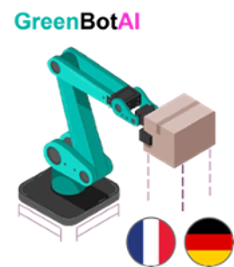GreenBotAI
Generative Adversarial Networks and Semantics for Resilient, Flexible Production Robots
Project description
The European manufacturing industry is facing several challenges. These include - and are not limited to, the change from mass production to mass customization, the ever-increased complexity of production lines, the competition with low-income countries, the risk of pandemics and the expectation of low defect rates. Against this backdrop, the Franco-German research project GreenBotAI has the following three main objectives:
- ensuring continuous production in Europe during pandemics,
- guaranteeing European sovereignty in terms of production automation,
- reducing the environmental impact of European factories by reducing the energy consumption of robotic applica-tions by 50%.
Focus of GreenBotAI is on reduction of the reaction and latency times of industrial robots, optimisation of smoothened path planning and the "on-the-fly execution" of certain tasks. The project addresses the development of necessary hardware components as well as state-of-the-art deep-learning methods for monitoring, data processing and error control in order to create a new generation in robotics. Environmental conditions are to be recognised automatically and the robot's behaviour is to be adapted to changing conditions in real time.
Within the project, it is planned to develop a "GreenBotAI kit" for industrial robots to equip them with intelligent applications and facilitate their construction. A kit will consist of a low-latency and energy-saving AI processor, a circuit board and associated software including the algorithms.
Consortium
France: GrAI Matter Labs SAS (lead), Arts et Métiers (ENSAM LISPEN)
Germany: Fraunhofer-Institut für Werkzeugmaschinen und Umformtechnik (IWU) (lead), Hochschule München (Fakultät für angewandte Naturwissenschaften und Mechatronik)
Duration
March 2022 – Februar 2025
Budget (Germany)
Total costs: € 1,7 million
Funding: € 1,6 million
- Recommend this page:
- Print view
